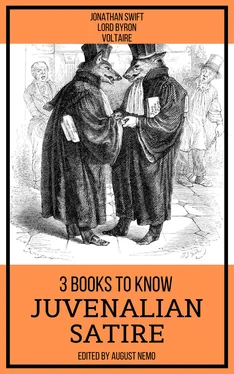But as he had some lucid intermissions,
She next decided he was only bad;
Yet when they ask'd her for her depositions,
No sort of explanation could be had,
Save that her duty both to man and God
Required this conduct—which seem'd very odd.
She kept a journal, where his faults were noted,
And open'd certain trunks of books and letters,
All which might, if occasion served, be quoted;
And then she had all Seville for abettors,
Besides her good old grandmother (who doted);
The hearers of her case became repeaters,
Then advocates, inquisitors, and judges,
Some for amusement, others for old grudges.
And then this best and weakest woman bore
With such serenity her husband's woes,
Just as the Spartan ladies did of yore,
Who saw their spouses kill'd, and nobly chose
Never to say a word about them more—
Calmly she heard each calumny that rose,
And saw his agonies with such sublimity,
That all the world exclaim'd, 'What magnanimity!'
No doubt this patience, when the world is damning us,
Is philosophic in our former friends;
'T is also pleasant to be deem'd magnanimous,
The more so in obtaining our own ends;
And what the lawyers call a 'malus animus'
Conduct like this by no means comprehends;
Revenge in person 's certainly no virtue,
But then 't is not my fault, if others hurt you.
And if your quarrels should rip up old stories,
And help them with a lie or two additional,
I 'm not to blame, as you well know—no more is
Any one else—they were become traditional;
Besides, their resurrection aids our glories
By contrast, which is what we just were wishing all:
And science profits by this resurrection—
Dead scandals form good subjects for dissection.
Their friends had tried at reconciliation,
Then their relations, who made matters worse.
('T were hard to tell upon a like occasion
To whom it may be best to have recourse—
I can't say much for friend or yet relation):
The lawyers did their utmost for divorce,
But scarce a fee was paid on either side
Before, unluckily, Don Jose died.
He died: and most unluckily, because,
According to all hints I could collect
From counsel learned in those kinds of laws
(Although their talk 's obscure and circumspect),
His death contrived to spoil a charming cause;
A thousand pities also with respect
To public feeling, which on this occasion
Was manifested in a great sensation.
But, ah! he died; and buried with him lay
The public feeling and the lawyers' fees:
His house was sold, his servants sent away,
A Jew took one of his two mistresses,
A priest the other—at least so they say:
I ask'd the doctors after his disease—
He died of the slow fever call'd the tertian,
And left his widow to her own aversion.
Yet Jose was an honourable man,
That I must say who knew him very well;
Therefore his frailties I 'll no further scan
Indeed there were not many more to tell;
And if his passions now and then outran
Discretion, and were not so peaceable
As Numa's (who was also named Pompilius),
He had been ill brought up, and was born bilious.
Whate'er might be his worthlessness or worth,
Poor fellow! he had many things to wound him.
Let 's own—since it can do no good on earth—
It was a trying moment that which found him
Standing alone beside his desolate hearth,
Where all his household gods lay shiver'd round him:
No choice was left his feelings or his pride,
Save death or Doctors' Commons—so he died.
Dying intestate, Juan was sole heir
To a chancery suit, and messuages, and lands,
Which, with a long minority and care,
Promised to turn out well in proper hands:
Inez became sole guardian, which was fair,
And answer'd but to nature's just demands;
An only son left with an only mother
Is brought up much more wisely than another.
Sagest of women, even of widows, she
Resolved that Juan should be quite a paragon,
And worthy of the noblest pedigree
(His sire was of Castile, his dam from Aragon):
Then for accomplishments of chivalry,
In case our lord the king should go to war again,
He learn'd the arts of riding, fencing, gunnery,
And how to scale a fortress—or a nunnery.
But that which Donna Inez most desired,
And saw into herself each day before all
The learned tutors whom for him she hired,
Was, that his breeding should be strictly moral;
Much into all his studies she inquired,
And so they were submitted first to her, all,
Arts, sciences, no branch was made a mystery
To Juan's eyes, excepting natural history.
The languages, especially the dead,
The sciences, and most of all the abstruse,
The arts, at least all such as could be said
To be the most remote from common use,
In all these he was much and deeply read;
But not a page of any thing that 's loose,
Or hints continuation of the species,
Was ever suffer'd, lest he should grow vicious.
His classic studies made a little puzzle,
Because of filthy loves of gods and goddesses,
Who in the earlier ages raised a bustle,
But never put on pantaloons or bodices;
His reverend tutors had at times a tussle,
And for their AEneids, Iliads, and Odysseys,
Were forced to make an odd sort! of apology,
For Donna Inez dreaded the Mythology.
Ovid 's a rake, as half his verses show him,
Anacreon's morals are a still worse sample,
Catullus scarcely has a decent poem,
I don't think Sappho's Ode a good example,
Although Longinus tells us there is no hymn
Where the sublime soars forth on wings more ample:
But Virgil's songs are pure, except that horrid one
Beginning with 'Formosum Pastor Corydon.'
Lucretius' irreligion is too strong,
For early stomachs, to prove wholesome food;
I can't help thinking Juvenal was wrong,
Although no doubt his real intent was good,
For speaking out so plainly in his song,
So much indeed as to be downright rude;
And then what proper person can be partial
To all those nauseous epigrams of Martial?
Juan was taught from out the best edition,
Expurgated by learned men, who place
Judiciously, from out the schoolboy's vision,
The grosser parts; but, fearful to deface
Too much their modest bard by this omission,
And pitying sore his mutilated case,
They only add them all in an appendix,
Which saves, in fact, the trouble of an index;
For there we have them all 'at one fell swoop,'
Instead of being scatter'd through the Pages;
They stand forth marshall'd in a handsome troop,
To meet the ingenuous youth of future ages,
Till some less rigid editor shall stoop
To call them back into their separate cages,
Instead of standing staring all together,
Like garden gods—and not so decent either.
The Missal too (it was the family Missal)
Was ornamented in a sort of way
Which ancient mass-books often are, and this all
Kinds of grotesques illumined; and how they,
Who saw those figures on the margin kiss all,
Could turn their optics to the text and pray,
Is more than I know—But Don Juan's mother
Kept this herself, and gave her son another.
Sermons he read, and lectures he endured,
And homilies, and lives of all the saints;
To Jerome and to Chrysostom inured,
He did not take such studies for restraints;
But how faith is acquired, and then ensured,
Читать дальше












